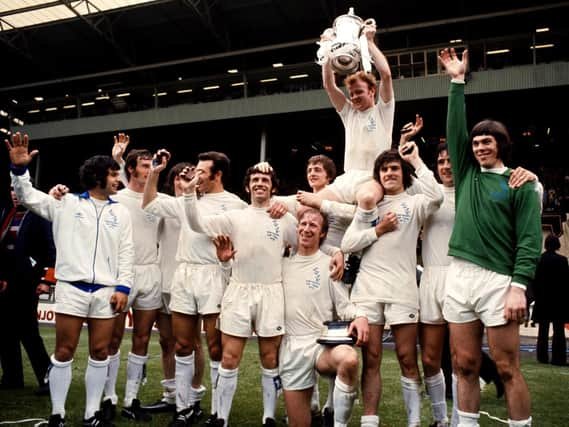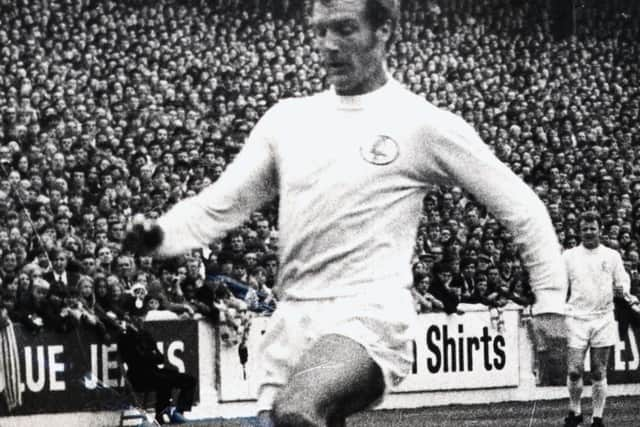Paul Madeley - the indispensable member of Don Revie's Leeds United


If anything, Giles undercut Madeley’s versatility. ‘The Eleven Pauls’ they called Madeley in the B-side released alongside ‘Marching on Together’ in 1972 and Revie would shiver at the idea of ever having to replace him. “When Paul quits it will be like losing 10 players,” said the Leeds United manager.
Revie’s squad oozed talent and genius but Madeley was unique amongst them, a footballer who defined the utility player. He was no jack-of-all-trades but a master of many, used in every single position by Revie and given every single shirt number bar that of goalkeeper. “Paul being Paul,” said Eddie Gray last night, “he’d have done a job for us in goal too.”
Advertisement
Hide AdAdvertisement
Hide AdBilly Bremner conjured the ‘side before self’ mantra at Elland Road but Madeley helped to embody it. Madeley was once quoted as saying that in the finest Leeds XI of all-time, he had no place. “I don’t figure in it even if I’m choosing the team,” he said. That modesty belied a career which Gray called “phenomenal”: 724 professional appearances, 34 goals, multiple England caps and all the honours that came the way of a golden generation. Madeley had class, style, and the stamina of a modern-day athlete. To Revie he was the ‘Rolls Royce’.


No Madeley in Leeds’ finest line-up? “Ask the players about that,” Gray said. “They’ll tell you. I sometimes hear people go through the best ever Leeds team: Giles, Bremner, Lorimer, Charles, Charlton, Hunter and so on. If anyone ever lists the best Leeds United team without him in it, I’d always ask ‘where’s Paul Madeley?’ Paul makes it every time.”
Born in Leeds in 1944, in the year before the end of the second world war, Madeley grew up in Beeston within walking distance of Elland Road. He followed United as a boy and dedicated his entire career to them, a one-club player who stuck with Leeds long after the heights of the Revie era had passed.
Advertisement
Hide AdAdvertisement
Hide AdEd, as he was known to Revie’s other players, joined the club’s youth team ranks in 1962 after half a season in the Yorkshire League with non-league Farsley Celtic. A quiet but dedicated teenager, he was 19 when he made his senior debut as a centre-back in January 1964, amid a short injury crisis affecting Jack Charlton and Freddie Goodwin.
Revie quickly latched onto Madeley’s versatility and intelligence but Madeley’s willingness to switch competently to any number of positions, and his reputation as a plug for holes in United’s side, obscured the extent of his influence. Between 1967 and 1974, when Revie left to take up the England job, Madeley averaged 37 appearances a season. Revie admired his aggression, his anticipation, his pace and his ability to cover the field. It was less a case of Madeley looking for somewhere to play than Revie insisting on finding somewhere to play him.
Madeley proved himself to be an accomplished defender, winning most of his England caps at right-back, but in 1968 he occupied an attacking role and wore the number nine shirt as Leeds won the League Cup final and their first major honour. The following season, on the way to a maiden Division One title, he acted as a midfield pivot for Giles and Billy Bremner. Les Cocker, Revie’s number two, once remarked that there was “no such thing as a 50-50 ball where Madeley’s concerned”. Madeley’s reactions - a “change of pace no player can match” - invariably made it his ball.
He retired in 1980 after 18 years on the books at Elland Road having played more than 700 times for Leeds and 24 times for England. The offer of an appearance at the World Cup came up in 1970 after injury ruled Paul Reaney out of Sir Alf Ramsey’s squad but Madeley, with a family holiday already arranged and little expectation of playing in Mexico, politely declined. He made his last international appearance in 1977, the same year that Leeds granted him a testimonial.
Advertisement
Hide AdAdvertisement
Hide AdAfter his retirement, Madeley worked in his family’s DIY business before selling it in the late 1980s in a multi-million pound deal. A series of health problems followed and he was diagnosed with Parkinson’s Disease in 2004. He later became the president of the Parkinson’s Disease Society in Leeds. “Some days are better than others,” he told the YEP in 2007. “But there are more people far worse than me. It doesn't get me down.”
He was, in the words of former Leeds striker Mick Jones, the model professional. The pair roomed together throughout their time at Elland Road. “He never drank, he never smoked, he said very little and he looked after himself perfectly,” Jones said. “He was before his time in that sense. He always trained hard, kept himself really fit, and yet he’s had all this trouble with his health for so long. Life’s not fair.”
Madeley is survived by his wife Ann and his sons Jason and Nick and, in the hall of fame created by Revie’s dynasty, forever worthy of a place. United’s players will wear black armbands during tonight’s friendly at Oxford United and celebrate Madeley’s life and career during their league game against Stoke City on August 5. “We wouldn’t have been the team we were without Paul,” Gray said. “That’s a fact.”